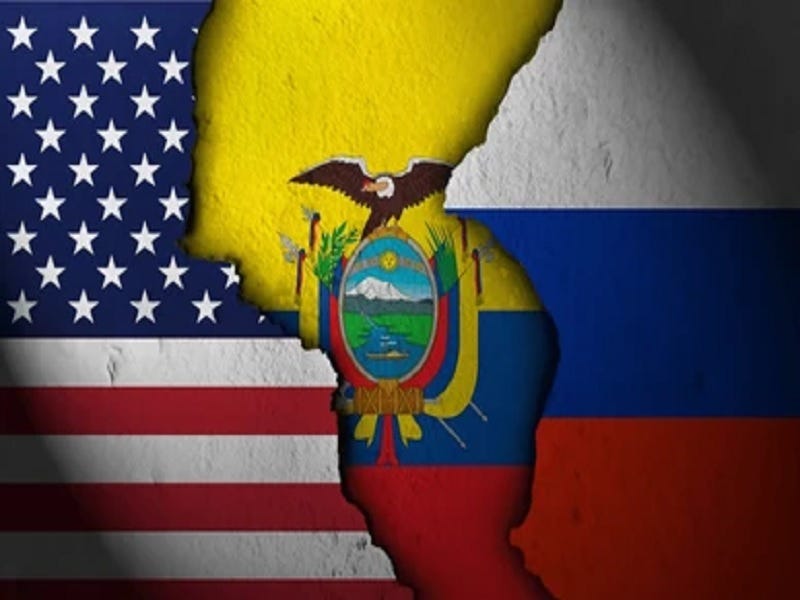Leftist-aligned members of the Alt-Media Community assumed that he’d do America’s bidding due to him being right-wing, yet he just defied their expectations in a surprisingly dramatic way. This proves that ideological affiliation in and of itself is no longer a sufficient indicator of a Latin American leader’s foreign policy.
New Ecuadoran President Daniel Noboa said last week that he was “surprised” that the US announced its plans to send to Ukraine the old Russian arms that he wanted to give them in exchange for modern American ones, which came after his Foreign Minister confirmed that they won’t go through with this swap. Both reaffirmed that Ecuador won’t get involved in other conflicts per its long-standing foreign policy, thus dealing a blow to the Pentagon’s efforts to scour the world for equipment to give to Kiev.
Here are three background briefings about this scandal:
* 11 January: “Why Did Ecuador Suddenly Decide To Transfer Old Russian & Ukrainian Arms To The US?”
* 14 February: “Moscow’s Response To Ecuador Sending Russian Arms To Ukraine Diversifies Trade With India”
* 19 February: “Ecuador Appears To Have Reconsidered The Wisdom Of Sending Russian Arms To Ukraine”
They’ll now be summarized and analyzed in light of this news.
Drug gangs tried to seize control of the country in early January but were prevented by the security forces, who then declared war against them. It was in this desperate context that President Noboa took the US up on its offer from a year prior to swap old Russian arms for modern American ones since he needed all the help he could get. Russia responded by suspending imports of bananas from Ecuador, which threatened to cut it off this $700 million a year market, thus prompting Quito to reconsider.
President Noboa then told CNN that Russia was “right” to object to this deal while telling them how “surprised” he was that the US announced its plans to transfer those old arms to Ukraine. He’s either “playing dumb” to “save face” after patching up this spat with Russia or he and his new Foreign Minister sincerely weren’t aware of the terms that the US proposed to his predecessor. Of note, neither are professional politicians or diplomats respectively, though he served in parliament from 2021-2023.
Whatever the truth may be, the optics are disadvantageous to American interests since they suggest that it was trying to manipulate the new Ecuadoran President against Russia. Leftist-aligned members of the Alt-Media Community assumed that he’d do America’s bidding due to him being right-wing, yet he just defied their expectations in a surprisingly dramatic way. This proves that ideological affiliation in and of itself is no longer a sufficient indicator of a Latin American leader’s foreign policy.
Former Brazilian President Jair Bolsonaro and newly re-elected Salvadoran President Nayib Bukele already debunked that stereotype, which was based on historical experiences during the Old Cold War, by refusing to sanction Russia and capitulate to demands to moderate his war on gangs respectively. President Noboa is therefore the third right-wing Latin American leader in recent years to pursue policies independent of Washington’s will.
His reversal on the swap that he previously agreed to could probably be attributed to the security forces stabilizing the situation a lot sooner than he anticipated, thus negating the need to contradict Ecuador’s long-standing foreign policy of not getting involved in other conflicts. He might have initially panicked in the immediate aftermath of the drug gangs’ failed attempted seizure of the state, hence why he agreed to these terms at that time, but then wisely reconsidered after Russia’s banana export suspension.
That economic punishment reminded him that there are consequences to scandalous foreign policy actions, and being the businessman that he is, he realized that it’s better to retain his country’s $700 million banana export market than lose it when there’s no longer the pressing national security need for this trade-off. His security services are already handling the situation impressively well and don’t urgently require modern American arms, which could now be obtained in a normal manner.
President Noboa and Bukele’s experiences in successfully saving their countries from drug gangs could be preemptively applied by those of their Latin American counterparts whose own countries are at risk of something similar transpiring in the coming future. Neither had to capitulate to American demands in order to safeguard their people, not even the Ecuadoran leader who was in a comparatively more desperate situation than his Salvadoran counterpart just last month.
The takeaways from this episode are several: 1) Latin America continues to reject the US’ offer to swap old Russian arms for modern American ones; 2) even states in pressing crises like Ecuador don’t need to agree to this; 3) let alone at the expense of unilaterally ruining multimillion-dollar trade with Russia; 4) the newly formed Bukele-Noboa models can ensure security for those countries whose leaders have the political will to implement them; and 5) all this proves that US influence over Latin America is declining.





It would be lovlely if Central and South America could clean themselves up. I remember marching to protest US machinations in El Salvador and Nicaragua decades ago. Those battles were lost and the narco world thrived. Some day, that history must be written.